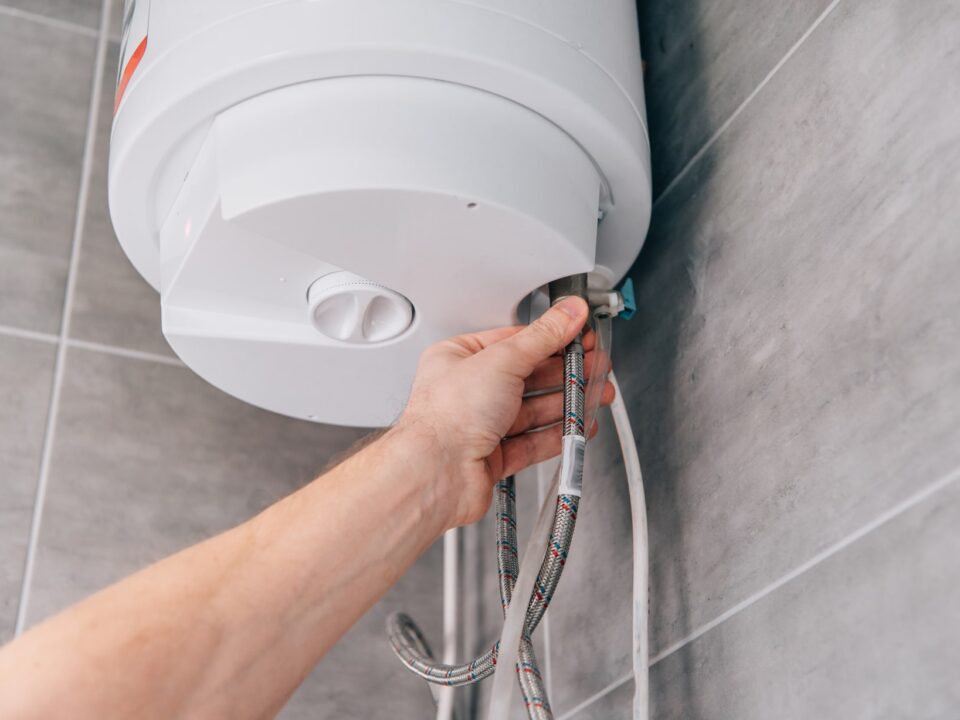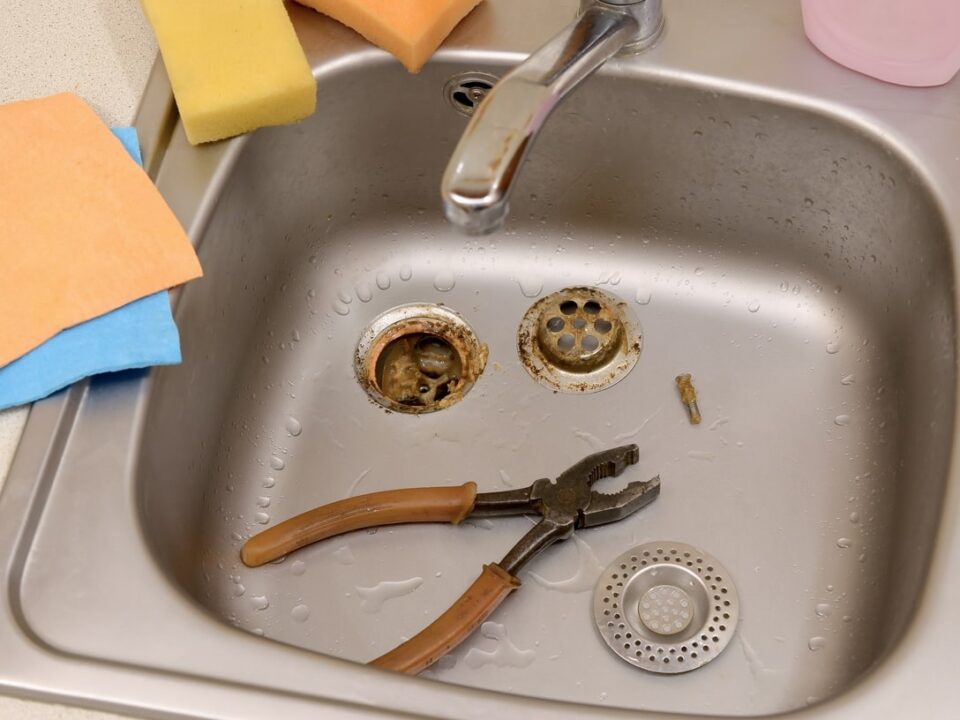
The Lifespan of Pipes in Florida: How Long Do Copper and Polybutylene Pipes Last?
February 6, 2024
Understanding Water Heater Drainage Issues: How to Unclog a Clogged Water Heater
March 7, 2024Is the loud noise coming from your garbage disposal driving you crazy? In this comprehensive guide by Babe’s Plumbing, Inc. & Fire Sprinklers, we explore the top reasons why your garbage disposal might be making that annoying racket. From loose mounting screws to a faulty motor, we cover it all. But don’t worry, we also provide easy-to-follow steps on how to fix the issue yourself, as well as valuable tips on preventing noisy garbage disposals in the future. Keep reading to learn more!
What Causes a Noisy Garbage Disposal?
A noisy garbage disposal can be caused by various factors, including loose mounting screws, worn-out blades, clogged or jammed disposal, a faulty motor, or a damaged impeller.
Loose mounting screws can result in vibrations that reverberate throughout the disposal, creating loud noises. When the blades become worn out, they may not properly grind food waste, causing the unit to strain and produce excessive noise. A clogged disposal can lead to blockages that impede normal operation, increasing the noise level. A faulty motor may struggle to function efficiently, leading to disruptive sounds during operation. Damaged impellers can also disrupt the smooth flow of waste, contributing to the noisy nature of the garbage disposal unit.
Loose Mounting Screws
Loose mounting screws in a garbage disposal unit can contribute to excess noise during operation, requiring timely fixing to ensure proper functionality.
This issue commonly arises due to regular vibrations and usage, causing the screws to become loose over time. When the mounting screws are not securely fastened, the entire unit can rattle and produce a loud, unsettling noise.
To address this problem, it is essential to first disconnect the power to the garbage disposal for safety. Next, locate the mounting screws underneath the unit and using a screwdriver, tighten them firmly. Make sure not to overtighten, as it may cause damage. Once the screws are securely in place, restore power and test the unit for noise reduction.
Worn Out Blades
Worn-out blades in a garbage disposal unit can lead to increased noise levels and inefficiency, necessitating prompt fixing or replacement to restore optimal performance.
The noise generated by garbage disposal with worn-out blades can be quite disruptive, making meal cleanup a less pleasant experience. The inefficiency caused by deteriorating blades may result in food remnants not being properly shredded, leading to potential clogs and drainage issues.
To tackle these problems, homeowners can consider options like sharpening the blades if they are not severely damaged or opting for a professional replacement for more extensive wear and tear. Proper maintenance and timely fixing of blade issues can significantly enhance the garbage disposal’s functionality and reduce noise levels.
Clogged or Jammed Disposal
A clogged or jammed garbage disposal unit can produce loud noises while operating, indicating the need for immediate fixing to resolve the obstruction and restore proper function.
The noise may be caused by food scraps, grease, or other debris stuck in the disposal unit. If left unaddressed, this blockage could lead to further damage and more extensive repairs.
- To begin fixing the issue, first, turn off the disposal and refrain from using it.
- Next, use a flashlight to inspect the inside of the disposal to identify the source of the blockage.
- Remember to always disconnect the power source before attempting to fix any garbage disposal problems for safety reasons.
Faulty Motor
A faulty motor in a garbage disposal unit can result in unusual humming or loud noises, necessitating professional fixing to address the underlying motor issues effectively.
These noises are often a sign of wear and tear on the motor components, which can lead to further damage if left unattended. Attempting to repair a faulty motor without the necessary expertise can be risky and may result in further complications. It is always recommended to seek the help of a professional to diagnose and fix motor-related problems in a garbage disposal unit. This ensures that the issue is resolved correctly and prevents any potential hazards associated with malfunctioning motors.
Damaged Impeller
A damaged impeller in a garbage disposal unit can lead to humming or noisy operation, highlighting the importance of fixing or replacing the impeller for optimal performance.
This noise can be not only disruptive but also a sign that there is a mechanical issue that needs attention. Ignoring the damaged impeller can further damage the disposal unit and lead to a complete breakdown. To address this, it’s essential to take prompt action to fix the impeller.
The process involves first cutting off power to the garbage disposal unit to ensure safety. Then, using a wrench, unscrew the mounting nut that holds the impeller in place. Carefully remove the damaged impeller and replace it with a new one, ensuring a secure fit for smooth functionality.
How to Fix a Noisy Garbage Disposal
- Fixing a noisy garbage disposal involves several steps such as tightening mounting screws, sharpening or replacing blades, clearing clogs or jams, checking and repairing the motor, and replacing damaged impellers.
- To start, make sure to disconnect the garbage disposal from the power source to prevent any accidents.
- Then, use a wrench to tighten the mounting screws securing the disposal to the underside of the sink.
- Inspect the blades for any dullness or damage; if needed, sharpen the blades with a garbage disposal wrench or consider replacing them.
- Next, check for any clogs or jams by using a garbage disposal wrench to manually rotate the impellers.
- If the motor is making unusual noises, it might need to be repaired or replaced.
- Examine the impellers for wear or breakage and switch out any damaged components as necessary.
Tighten Mounting Screws
To address noise issues, tightening the mounting screws of a garbage disposal unit is essential for stabilizing the unit and reducing excess vibrations during operation.
This step is crucial in ensuring that the disposal unit functions optimally and quietly. When the mounting screws are loose, they can create rattling sounds and cause the unit to shift during use. By tightening the screws, you can secure the unit in place, preventing it from moving around and producing unnecessary noise.
Proper fastening also helps to maintain the alignment of components within the garbage disposal, promoting smooth operation. Taking the time to regularly check and tighten these screws can prevent potential breakdowns and extend the lifespan of your appliance.
Sharpen or Replace Blades
Sharpening or replacing blades in a garbage disposal unit can effectively eliminate noise issues, ensuring smooth and efficient grinding of food waste.
Regular maintenance is key to keeping your garbage disposal unit functioning well. To maintain sharp blades, it is advisable to regularly run ice cubes or citrus peels through the unit to help sharpen the blades. In case the blades are damaged beyond repair, replacing them is a viable solution. When fixing or replacing blades, always remember to unplug the unit and use the right tools for the task. Checking for any loose or worn-out components can also contribute to noise reduction and improve the overall performance of your garbage disposal unit.
Clear Clogs or Jams
Clearing clogs or jams in a garbage disposal is crucial to prevent noise and restore proper functionality, requiring careful handling to avoid further damage.
To begin the process of fixing a clogged garbage disposal, start by ensuring the unit is turned off and unplugged to avoid any accidental injuries. Next, use a flashlight to investigate the blockage inside the disposal. You can gently remove any visible debris or foreign objects using long-handled tongs or pliers. Avoid putting your hands inside the disposal area. Using a hex key, you can manually rotate the disposal’s impeller to help dislodge any stubborn clogs. Remember to never use chemical drain cleaners as they can damage the disposal. Once cleared, run cold water for a few minutes to flush out any remaining debris.
Check and Repair the Motor
Inspecting and repairing the motor of a garbage disposal unit can resolve noise issues, ensuring smooth operation and prolonged appliance lifespan.
- To start the motor inspection for noise reduction, first, ensure to disconnect the power supply to the garbage disposal for safety.
- Next, remove the splash guard and visually inspect the motor components for any visible damage or debris.
- Clean the motor shaft and bearings carefully to eliminate any obstructions or buildup causing the noise.
- If the issue persists after cleaning, it is recommended to seek professional assistance for a thorough diagnosis and fixing of the motor to ensure optimal performance of the garbage disposal unit.
Replace Damaged Impeller
Replacing a damaged impeller in a garbage disposal is essential to eliminate humming or noisy operation, restoring the unit’s functionality and efficiency.
When the impeller in garbage disposal becomes damaged, it can impede the unit’s ability to efficiently grind food particles, leading to frustrating noise disturbances. By fixing the impeller, you not only address the source of the problem but also prevent further damage to your garbage disposal.
This step is crucial in maintaining the proper functioning of the disposal unit, ensuring that it operates smoothly and quietly. Understanding the process of fixing the impeller can help you prolong the lifespan of your garbage disposal and avoid costly repairs in the future.
Preventing Noisy Garbage Disposals
To prevent noisy garbage disposals, proper use and maintenance, avoiding certain items in the disposal, and regular cleaning and checks are essential practices to follow.
By ensuring that only small food scraps and no non-food items go into the garbage disposal, you can significantly reduce the chances of it becoming noisy. Running cold water while using the disposal and periodically grinding ice cubes to clean the blades are effective preventive measures. Regularly inspecting the disposal for any signs of wear or leaks can catch potential issues before they escalate into noisy disruptions. Remember, a well-maintained garbage disposal not only operates quietly but also extends its lifespan.
Proper Use and Maintenance
Proper use and regular maintenance of a garbage disposal unit are key factors in preventing noise issues and ensuring long-term functionality and efficiency.
Preventing noisy garbage disposals is essential not just for a quieter kitchen environment but also for the longevity of the appliance. By taking simple steps like avoiding putting fibrous or hard-to-grind items such as potato peels and bones into the disposal, you can significantly reduce the chances of encountering noisy operations.
Running cold water before, during, and after using the garbage disposal can help keep the unit from overheating and prevent clogs. Following these maintenance tips will not only keep your garbage disposal running smoothly but also save you from costly repairs down the line.
Avoid Putting Certain Items in the Disposal
Avoiding the disposal of certain items such as hard bones, fibrous foods, and grease can help prevent clogs, jams, and noise in garbage disposals, enhancing their efficiency.
Hard bones should be avoided in garbage disposals as they can damage the blades and lead to blockages. Fibrous foods like celery, corn husks, and onion skins can wrap around the blades, causing them to jam. Grease should not be poured down the disposal as it solidifies and can clog the pipes. Instead of putting these items in the garbage disposal, dispose of hard bones in the trash, compost fibrous foods, and collect grease in a container to be thrown in the trash.
Regularly Clean and Check for Issues
Regular cleaning and periodic checks for issues like leaks, strange noises, or odors can help maintain optimal performance and prevent the noisy operation of garbage disposals.
Establishing a routine for cleaning and inspecting your garbage disposal is essential in ensuring its longevity and efficiency. By taking proactive maintenance steps, you can prevent clogs and breakdowns that may result in costly repairs.
Simple tasks like running cold water while using the disposal and avoiding putting certain items like grease and fibrous foods down the drain can go a long way in keeping your unit running smoothly.
When to Call a Professional
If your garbage disposal is not working despite troubleshooting attempts, it is advisable to call a professional service provider like Babe’s Plumbing, Inc., for expert repair and resolution of the issue.
Attempting to fix a malfunctioning garbage disposal without the necessary expertise can result in further damage. Seeking professional help ensures that the problem is accurately diagnosed and efficiently resolved. Babe’s Plumbing, Inc. specializes in repairing a wide range of plumbing issues, including garbage disposal malfunctions. By choosing Babe’s Plumbing, Inc., you can benefit from their experienced technicians who use the latest tools and techniques to fix your garbage disposal promptly, restoring functionality to your kitchen sink in no time.




